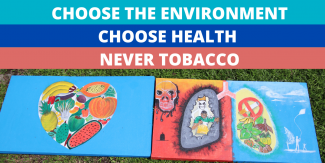Today is World No Tobacco Day and public health champions around the world are marking this day by focusing on the harmful impacts of the tobacco industry on the environment.
The theme for this year is ‘Tobacco: Threat to our Environment’. This is timely as we are moving into the One Health approach to effectively address health issues that are linked to our environment and the 2022 global campaign is aimed at raising public awareness about the environmental impact of the entire tobacco cycle, from its cultivation, curing, manufacturing, and distribution to the toxic post-consumer waste it produces.
Tobacco continues to plague global population health and kills over 8 million people every year. Unfortunately for us in the Pacific region, tobacco use persists as a leading risk factor for disease. According to surveys, adult smoking prevalence ranges between 5% (in women) to almost 80% (in men) and smoking prevalence amongst children (13-15 years) ranges between 5.6% and 52.1%. These surveys also indicate that the wide range in adult and youth smoking prevalence across the region is predicted to continue increasing if tobacco control efforts are not ramped up.
To address this, our Pacific leaders are already making the commitment to take action on tobacco as part of efforts to achieve a Tobacco Free Pacific 2025 and aligning legislations to the World Health Organization (WHO) Framework Convention for Tobacco Control (FCTC) commitments.
The Pacific Community (SPC) in collaboration with the WHO and other development partners is ramping up its support to Pacific communities in reviewing and strengthening policy, regulatory and enforcement mechanisms related to smoke-free environments, advertising, sponsorship and promotion, taxation, packaging and labelling, sales and licensing.
We have been working with Pacific Island Countries and Territories (PICTs) through the monitoring of tobacco preventative policies in the Pacific Monitoring Alliance for NCD Action (MANA), and assessment results show us that preventing tobacco industry interference remains a key policy gap across the Pacific requiring urgent national action.
We know that industry interference can thwart efforts to strengthen policy and legislation and with its greenwashing tactics to discredit their harmful contributions to the environment, and this is an area that SPC and partner agencies are encouraging countries to make a policy priority.
With the recent endorsement of the Pacific Legislative Framework (PLF) setting out legislative policies, legislation plan and draft legislative provisions to address tobacco control issues including interference, we are working in collaboration with partner agencies to scale up capacity building for countries and supporting them in their efforts to counter the range and forms of tobacco industry interference and the strategies used by industry in its efforts to derail or weaken strong tobacco control policies.

